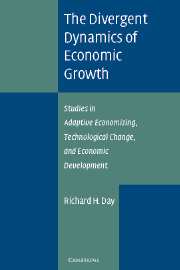 The Divergent Dynamics of Economic Growth
The Divergent Dynamics of Economic Growth Book contents
- Frontmatter
- Contents
- Preface
- Acknowledgments and Comments
- 1 The Adaptive, Evolutionary Theory of Divergent Economic Growth
- PART ONE GLOBAL TRENDS AND ADAPTIVE ECONOMICS
- PART TWO TECHNOLOGICAL CHANGE IN AGRICULTURE AND INDUSTRY
- PART THREE EPOCHAL DEVELOPMENT
- 8 Economic Development and Migration
- 9 Instability in the Transition from Manorialism
- 10 Do Economies Diverge? Economic Development in the Very Long Run
- PART FOUR TOWARD A GENERAL THEORY OF DEVELOPMENT
- Index
8 - Economic Development and Migration
Published online by Cambridge University Press: 08 August 2009
- Frontmatter
- Contents
- Preface
- Acknowledgments and Comments
- 1 The Adaptive, Evolutionary Theory of Divergent Economic Growth
- PART ONE GLOBAL TRENDS AND ADAPTIVE ECONOMICS
- PART TWO TECHNOLOGICAL CHANGE IN AGRICULTURE AND INDUSTRY
- PART THREE EPOCHAL DEVELOPMENT
- 8 Economic Development and Migration
- 9 Instability in the Transition from Manorialism
- 10 Do Economies Diverge? Economic Development in the Very Long Run
- PART FOUR TOWARD A GENERAL THEORY OF DEVELOPMENT
- Index
Summary
Introduction
Economic development is a process of change, a process of getting out of the existing state. Newly developing economies may have as examples the paths already trodden by their advanced counterparts. Each economy has distinct initial conditions, however, and each has to find its way onto the trodden path or to seek out a new, unbeaten path altogether. Either way is difficult and irreversible. Each may be far from optimal in retrospect.
When an economy undergoes change, it generates signals that motivate adjustments by the various economic agents and sectors. These adaptations induce still further adaptation. In each period the actors arrive at “optimal” decisions, taking into account their own perceived constraints and current objectives based on available information flowing through the economic environment from previous periods. Individuals, caught up in a turbulent current of economic activity, keep adapting to a changing environment and making the best decisions they can given the uncertainties and their limited foresight. Their decisions jointly determine the next state of the economy through a structure only accounted for in part in the individual plans. The economy as a whole searches its way through a complex terrain, stretch by stretch, and as it moves along it undergoes an irreversible metamorphosis. This adaptive point of view yields a new perspective on the relationships among producing sectors and migration during economic development.
The experiences of economically advanced countries indicate that the degree of urbanization is highly correlated with the level of economic development.
- Type
- Chapter
- Information
- The Divergent Dynamics of Economic GrowthStudies in Adaptive Economizing, Technological Change, and Economic Development, pp. 141 - 157Publisher: Cambridge University PressPrint publication year: 2003
- 1
- Cited by
